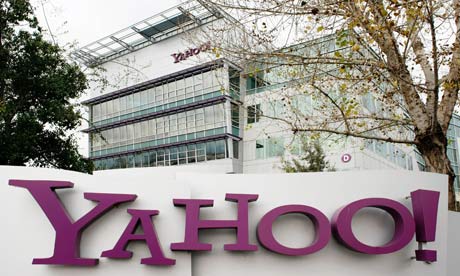
There's no shortage of opinions about the future of Yahoo, and entrepreneur Jason Calacanis never has a shortage of opinion about anything. But his latest columns about the direction of Yahoo raise some cracking points that seem to make the web firm's priorities crystal clear.
As he says: "Right now three dozen Yahoo salespeople are printing this out and running to Ross Levinsohn's office screaming "Please for the love of God do what Calacanis is saying."
It's possible, given the whiff of desperation about the place, that trawling the internet for clues is actually an option for Yahoo's executives. Fortunately, in this case, there's some gold in them there hills.
Chief executives
Post-Carol Bartz, criticism has swung back to chairman Roy Bostock, according to the Wall Street Journal. That probably wasn't a backlash he'd predicted when firing her by phone.
Bostock was at the helm when Yahoo repeatedly spurned Microsoft's $45bn acquisition deal, but also recruited Bartz. In the wake of her departure, he's facing questions about her suitability because of a lack of web and online advertising experience. You could ask why those same shareholders didn't ask that earlier. Forbes adds that Bostock narrowly escaped being voted off the board when previous chief executive Terry Semel was voted out, and says Bostock should be held responsible for his share in Yahoo's failure.
Calacanis's take on the CEO role at Yahoo is very interesting: he notes that Bartz was an operational expert, while AOL's Tim Armstrong is a sales guy. Are they the right people to lead content-focused companies?
"This is what boards need to learn: top slot = product person, second slot = operations person. Not the other way around," he wrote.
"You have to gamble with a product maniac like Larry Page, Steve Jobs, Mark Zuckerberg, Mark Pincus or Sergey Brin in our business."
Spending 80% of time on deals, sales, and operations, but only 20% on product, is wrong, he says. Cutting costs and streamlining company operations was the success of Bartz, but what she didn't do was build innovative new products that helped define Yahoo's future. His money is on Ross Levinsohn, currently executive vice-president of Yahoo Americas, or News Corporation's chief digital officer Jon Miller taking over as CEO.
Key product areas
"Yahoo's future is mobile, social and video. Cutting services like Yahoo Live was a mistake," said Calacanis, but the company should focus on adding those three features to all its content.
"Yahoo could do that across every content vertical with their current assets by shutting down more side projects and hiring the top content creators in the world."
Acquisitions
Calacanis's delightfully ambitious acquisition plan – including his own site, natch – is the way to achieve this growth.
His shopping list (part of a revamp cost of $1bn, he says) includes Gawker – he'd put Nick Denton on the Yahoo board – The Atlantic, Business Insider and Robert Scoble, whom he'd buy out of Rackspace and place, with a team of geeks on the Yahoo campus.
It's a formidable line-up, but is it one Yahoo could or would even dare try to pull off? It has a cabal of increasingly panicky ad-cautious shareholders pushing to get as much return as possible on a business that is being driven as conservatively as possible, with considerable market pressures – even if it is profitable. That's not an atmosphere in which innovation – or an audaciously confident comeback plan – might be allowed to succeed.
You have to admire Calacanis's chutzpah, not least for the characteristic presumptuousness of his unsolicited advice, but also for advocating that Yahoo spends between $75m to $150m buying his own site, Mahalo. Gotta love him.
Though he has the freedom of independence and imagination – and doesn't have thousands of shareholders breathing down his neck – there's more clarity and vision in his plan than in anything Yahoo has publicly proposed.







